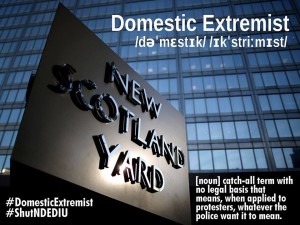


 On 5 February, the third annual Domestic Extremist Awareness Day is calling for the closure of the discredited police unit responsible for surveillance on political dissent.
On 5 February, the third annual Domestic Extremist Awareness Day is calling for the closure of the discredited police unit responsible for surveillance on political dissent.
If you are an anti-fracking campaigner, you may have been branded a domestic extremist by a Prevent anti-radicalisation workshop, or identified as one when stopped unexpectedly at a UK airport. A whistleblower has revealed police were so desperate to stop a Green Party peer from discovering the extent of their labelling of her as one that they improperly destroyed files she had asked for.
The police, it seems, remain obsessed with finding so-called ‘domestic extremists’ amongst campaigners and activists. In spite of the launch of a public inquiry into the activities of undercover police officers, however, there remains little real scrutiny of the Metropolitan Police’s National Domestic Extremism and Disorder Intelligence Unit (NDEDIU).
Allegations about the shredding of documents on London Assembly member Jenny Jones are not the first time that Britain’s political police have appeared to act with impunity. Indeed, the inquiry led by Lord Justice Pitchford will look specifically at the failure back in the 1990s to disclose information to the Stephen Lawrence Inquiry about evidence of police corruption in the investigation into Stephen’s death, or about the covert surveillance targeted against the Lawrence family.
In both cases, senior officers knew about the actions of their secretive intelligence units, but management was “complacent and possibly negligent”. It seems little has changed and it is impossible to imagine one of the Met’s current leads on the Pitchford Inquiry, Assistant Commissioner Martin Hewitt, knew nothing of the NDEDIU’s response to Jenny Jones’ request for her ‘domestic extremist’ file, or is unaware of the potential damage to an ‘independent’ public inquiry that is completely dependent on the police to release the kind of documents officers are apparently busy destroying.
This is why on Friday 5 February, Netpol is organising the third annual “Domestic Extremist Awareness Day”.
Once again we are asking campaigners to share the reasons why they might find themselves labelled as a ‘domestic extremist’ and, where appropriate, to help us find evidence for the European legal challenge against mass surveillance of protesters.
However, we are also supporting calls this year for the immediate closure of the National Domestic Extremism and Disorder Intelligence Unit. The NDEDIU can no longer continue, with no transparency or accountability, to spy on protesters, smear a wide range of political dissent as ‘extremist’ and shred evidence of its activities.
Join the debate online on 5 February using the hashtags #domesticextremist and #ShutNDEDIU